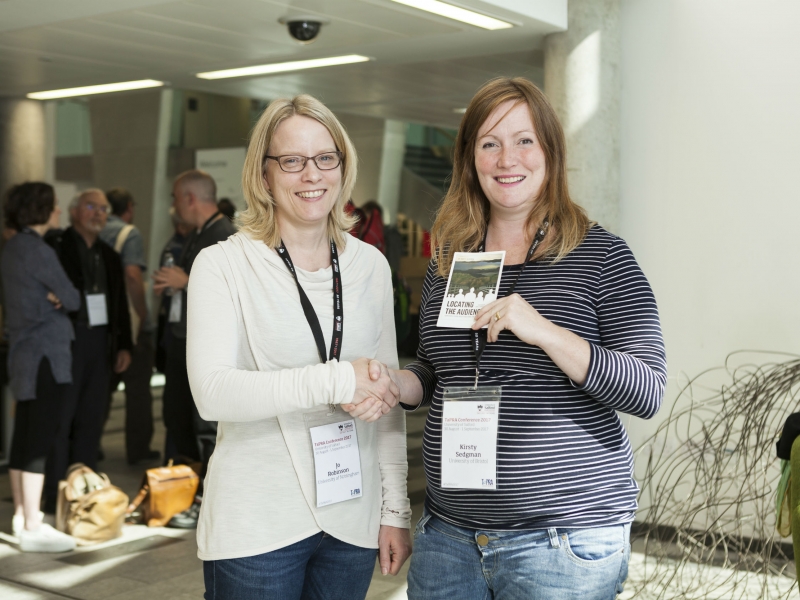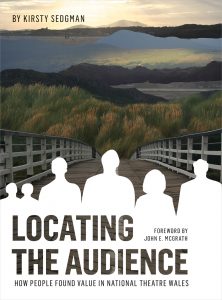Early Career Research Prize
This prize recognises excellent research from an early-career researcher and is made for a single short-form piece of research in the public domain.

PRIZES
2023
WINNER
Bryony White
Returning to the Scene of the Crime: Gendered and Racialised Violence in Ana Mendieta’s Rape Scene (1973)
The essay provides a thorough and nuanced reading of how Ana Mendieta’s The Rape Scene engages with the racializing and gendered logics of legal redress in the relation to sexual violence. While much has been written on this performance, this article is notable for its careful attention to trauma and affect, drawing on theories of forensics, re-enactment, and queer of colour critique. It is an exemplary performance analysis, one that is novel for its revisionary claims and sustained commitments to tying together debates around (mis)recognition in both performance and law. The essay’s focus on Mendieta’s important performance aids to foreground experiences and perspectives of Latinx artists in histories of performance art. This is an intricate and erudite piece that, among other things, provides a teachable resource for discussing a very difficult work and demonstrates how scholars can engage ethically and politically with art having to do with histories of racialised sexual violence. The tone of the argument – often raising the questions that cannot be answered but that are key for understanding the work’s power – resonates with Mendieta’s piece in asking of the twenty-first century reader important (yet unanswerable) questions about spectatorship and complicity in the face of acts of (gendered, racialised, sexual, patriarchal or state) violence. The focus on the effectiveness of cruelty as an aesthetic and political strategy is a further strong intervention in discourses surrounding the use of trigger warnings.
SHORTLISTED
Dionysia Bouzioti
Medea Inside
Emma McDowell
Mixing Methods in Audience Research Practice: A Multi-method(ological) Discussion
2022
WINNER
Ella Parry-Davies
Immigration Infrastructure Theatricalised in Illegalised and The Claim, Contemporary Theatre Review, 31:4, pp.409–421.
The essay makes a strong argument for the unique and urgent contribution of theatre and performance research to wider systems of knowledge about the world. It articulates the perils of narratives which amplify victimhood and philanthropy and makes a strong case for revealing the mechanisms through which infrastructures performatively enact their processes emphasising the fallibility of the humans performing those processes. The author convincingly argues that performance is uniquely placed to challenge the invisibility of such infrastructure. The politics of the piece are not gestural – the article works through the performance and real-world processes in remarkable detail.
2021
Katherine Graham
Between material and perception: towards an aesthetics of scenography (Theatre and Performance Design, 2020, 6:1–2, pp.9–25)
In a strong field, the judges felt this essay deserved the prize for its rigorous synthesis of existing scholarship and its paradigm-expanding critical work. The essay draws from materialist philosophy and questions of relationality to rethink how we might understand the scenographic in relation to aesthetics. It provides a richly theorised extension of recent debates in scenographic studies, opening these debates up to new critical frameworks. This is highly compelling and speaks to work across theatre and performance studies as a whole. The article is thoroughly researched and thoughtfully and precisely articulated. This is high quality work that is deserving of recognition.
2019
Naomi Paxton
for work on Suffrage Theatre and the Actresses’ Franchise League.
TaPRA is delighted to award its 2019 Early Career Researcher Prize to Dr Naomi Paxton, whose work represents a fresh, detailed account of an important period of British theatre. Her rigorously researched monograph, Stage Rights! (Manchester University Press, 2018), traces the significance of the Actresses’ Franchise League from their founding in 1908, through the outbreak of WWI and into the mid twentieth-century. By interrogating its activities in terms of a blurring between ‘acting’ and ‘being’, the panel noted that Dr Paxton offers an unexpected extension of existing analyses of the AFL’s work and prompts new readings of the function of theatre in/as society. Additionally, in advancing understandings of theatrical, political, and social activism in the women’s suffrage movement, Dr Paxton’s impactful methods of public engagement (in the form of games, guided walks, exhibition and performances) have made her research accessible to audiences beyond the academy in innovative ways.
Katie Beswick
for Social Housing in Performance: The English Council Estate on and off Stage (Bloomsbury, 2019)
Konstantinos Thomadis
for research in interdisciplinary Voice Studies.
2018
Margherita Laera
for work on ‘Translation, Adaptation, Otherness: “Foreignization” in Theatre Practice’ (www.translatingtheatre.com).
Launched right at the point when the UK’s Brexit referendum was reaching its explosive conclusion, the judges felt that the ‘Translation, Adaptation, Otherness’ project represents an important – and deeply timely – investigation of how theatre in translation can be used to address contemporary tensions between varying cultures and languages by disrupting audiences’ expectations. Identifying and addressing a unique problem in a highly innovative way, the project constitutes a significant expansion of our current knowledge of theatre in translation and adaptation, with major implications for both performance scholarship and practice.
Sarah Grochala
for The Contemporary Political Play: Rethinking Dramaturgical Structure (Bloomsbury, 2017)
Joanne Scott
for Intermedial Praxis and Practice as Research: ‘Doing-Thinking’ in Practice (Palgrave Macmillan, 2016)
2017
Kirsty Sedgman
for development of work on audience research including Locating the Audience (Intellect, 2016).
The judges felt that few studies in this field are as successful as this in demonstrating the complexity of research that is able to deliver a real understanding of audience experience while maintaining a sharp critical focus. The work is already having an impact and at a time when the ‘audience experience’ is so often relegated to consumer response and metrics data, Sedgman’s work is a welcome turn to the live and lived experience of and for the people who buy the tickets.
Georgina Guy
for Theatre, Exhibition, and Curation: Displayed & Performed (Routledge, 2016)
Rachel Hann
for leadership in the areas of costume and practice research.
2016
Matt Hargrave
Theatres of Learning Disability: Good, Bad, or Plain Ugly? (Palgrave)
The judges felt that from inside, from outside, this project shows change towards place in action and declares its ambition for further work. It is the work of considered scholarship and practice: far reaching, versatile, inclusive and impactful both for the communities with which it worked and for the academic sector which TaPRA represents.
Royona Mitra
Akram Khan: Dancing New Interculturalism (Palgrave).
George Home-Cook
Theatre and Aural Attention: Stretching Ourselves (Palgrave)
Kate Elswit
Watching Weimar Dance (Oxford University Press)
Anna Harpin
for her co-edited collection, Performance, Madness, Psychiatry: Isolated Acts (Palgrave) and an article in the journal Interdisciplinary Science Reviews.
2015
Adrian Curtin
for his book Avant Garde Theatre Sound: Staging Sonic Modernity (Palgrave)
Adam Alston
for his work on the aesthetics and politics of audience participation.
Adam Alston
for his work on the aesthetics and politics of immersive theatre.
Bryce Lease
for his work on Polish and Central European Theatre.
2014
Dominic Johnson
for his extensive work on Live Art.
Vicky Angelaki
The Plays of Martin Crimp: Making Theatre Strange (Palgrave)
Patrick Duggan
Trauma/Tragedy: Symptoms of Contemporary Performance (Manchester University Press)
2013
Laura Cull
for her work in establishing Performance Philosophy through a range of publications and projects.
Dominic Johnson
Glorious Catastrophe: Jack Smith, Performance and Visual Culture (Manchester University Press)
Patrick Duggan
Trauma/Tragedy: Symptoms of Contemporary Performance (Manchester University Press)
2012
Jenny Hughes
Performance in a Time of Terror: Critical Mimesis and the Age of Uncertainty (Manchester University Press)
Alison Jeffers
Refugees, Theatre and Crisis: Performing Global Identities (Palgrave)
MAKE A
Nomination
Only current TaPRA members can submit nominations for our awards or elections. Each nomination requires a seconder, who must also be a current member.
TaPRA 2025 at Warwick
Our 2025 conference will be hosted in partnership with the University of Warwick, 27-29 August 2025
TaPRA 2025 at Warwick
Our 2024 conference will be hosted in partnership with the University of Warwick.


